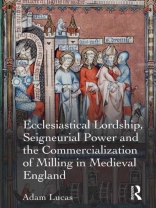This is the first detailed study of the role of the Church in the commercialization of milling in medieval England. Focusing on the period from the late eleventh to the mid sixteenth centuries, it examines the estate management practices of more than thirty English religious houses founded by the Benedictines, Cistercians, Augustinians and other minor orders, with an emphasis on the role played by mills and milling in the establishment and development of a range of different sized episcopal and conventual foundations. Contrary to the views espoused by a number of prominent historians of technology since the 1930s, the book demonstrates that patterns of mill acquisition, innovation and exploitation were shaped not only by the size, wealth and distribution of a house’s estates, but also by environmental and demographic factors, changing cultural attitudes and legal conventions, prevailing and emergent technical traditions, the personal relations of a house with its patrons, tenants, servants and neighbours, and the entrepreneurial and administrative flair of bishops, abbots, priors and other ecclesiastical officials.
Adam Lucas
Ecclesiastical Lordship, Seigneurial Power and the Commercialization of Milling in Medieval England [PDF ebook]
Ecclesiastical Lordship, Seigneurial Power and the Commercialization of Milling in Medieval England [PDF ebook]
Kup ten ebook, a 1 kolejny otrzymasz GRATIS!
Format PDF ● Strony 436 ● ISBN 9781317146476 ● Wydawca Taylor and Francis ● Opublikowany 2016 ● Do pobrania 3 czasy ● Waluta EUR ● ID 4890140 ● Ochrona przed kopiowaniem Adobe DRM
Wymaga czytnika ebooków obsługującego DRM












